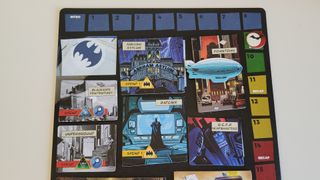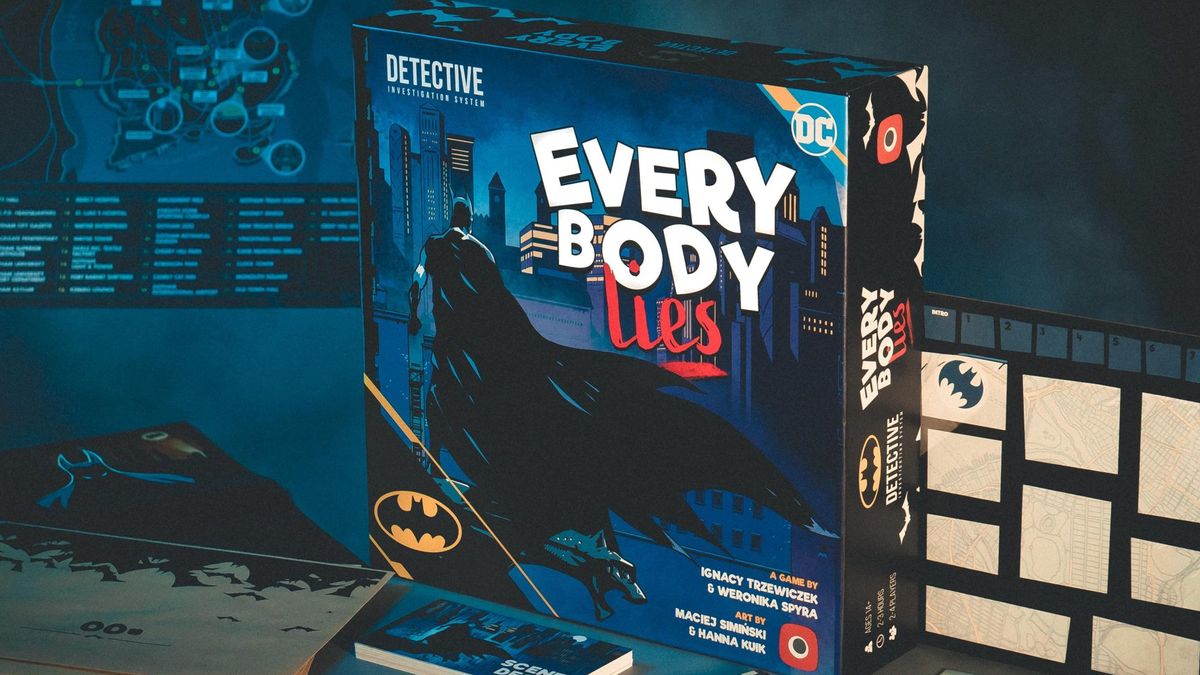12DOVE Verdict
Fans of the Dark Knight will have a great time with Batman: Everybody Lies thanks to its excellent story, but others won't be so enamoured due to a lack of strategy, unnecessary digital elements, and an overabundance of text that slows down play in larger groups.
Pros
- +
Tells a gripping detective yarn set in Gotham City
- +
Pitches clues at just the right balance of difficulty
Cons
- -
Lots of read-out-loud text gets tiresome with larger groups
- -
No strategic aspects to the decision making
- -
Requires use of a website that adds nothing to the play experience
Why you can trust 12DOVE
Batman hasn’t just become a box-office and video game draw; his popularity ensures that he’s big in board gaming too. The Caped Crusader's latest tabletop outing is Batman: Everybody Lies, an iteration of Portal Games’ Detective series. These titles challenge players to solve crimes by scrutinising lots of text and a few image cards for clues before trying to piece the puzzle together. In other words, they let you channel the 'Dark Knight Detective' side of Batman's identity.
Seeing as The Batman recently reminded us that the vigilante is also the world’s greatest detective, it feels like Batman: Everybody Lies has arrived at exactly the right time.
What is it, and how does it work?

- Game Type: Co-op mystery
- Players: 2 - 4
- Difficulty: Moderate
- Lasts: 2hrs+
- Ages: 14+
- Price: $50 / £39.99
- Play if you enjoy: Portal Games' Detective series, Sherlock Holmes: Consulting Detective
Text-heavy detective adventures aren’t a new idea for board games (just look at Bureau of Investigation) and, like most of them, Batman: Everybody Lies is easy to learn. After all, the meat of the game is in sleuthing for clues amidst all the narration and case files you uncover, so there’s no need for heavy rules to do the heavy lifting. You will, however, need access to a computer as some of the material you have to read is only available online.
Each player chooses a character, from Vicki Vale to Harvey Bullock (sorry, Batman himself isn’t an option... although you can access his input into cases via another character, Catwoman). You then pick one of four scenarios, which posits a question you must solve and a number of leads to get you started. Each lead is tied to a particular location on the game board and comes with a ream of text to read out and, sometimes, a 'scene' card with comic book art that can contain additional clues. Often you’ll also have to go to the website to look at things like police reports.
Some leads will also give characters secret personal goals to accomplish
Each turn you advance the investigation track, which is essentially a timer, and follow a lead. Moving locations can be free, but most of them (like the GCPD) require an access token that the characters can buy with investigation tokens, which can be obtained from leads or sacrificing time on the investigation track. Some leads will also give characters secret personal goals to accomplish, which may impact the scenario overall or might be just for fun to help you roleplay your character.
This continues until the group feels they have enough information to answer the question posed at the beginning of the scenario. You then go back to the website, which will quiz you on the overall goal and any relevant personal goals that you picked up. Your answers, combined with your position on the investigation track (which indicates how fast you cracked the case) will provide you with an overall score.
Gameplay

Batman: Everybody Lies lists a player count of two to four, but if you try and play it with a larger group, you’ll immediately encounter a problem. Between the lead cards and the case files online, there’s a lot of text to read every single turn. That means either someone reading it out loud, or passing the cards around. In both cases, it adds up to plenty of downtime, a problem that only grows as you add players. Throw in the additional time required for players to parse their text-heavy personal goals and you have a game where you spend a lot of time doing nothing.
As a result, the game works better as you reduce the player count or even as a board game for 2 players. In fact, despite the player count on the box, it works quite well solo, although you’ll miss the pleasure of discussing possible solutions with your fellow players, something that’s baked into the game through 'recap' spaces on the timer track. A solitaire player will also miss out on hidden personal goals, but in truth, hiding these doesn’t add a great deal to the game. A canny team will be sure to solve those that add to the score and ignore those that don’t unless the necessary clues land in their laps.
The tale is dark and often quite gruesome
If you can muster the effort to climb those significant hurdles, you’ll find that Batman: Everybody Lies tells a decent Batman story. All the key elements are here from classic comic book villains to corrupt cops, and the tale is dark and often quite gruesome. The details you’ll need to crack each case are well-presented too, not stated obviously nor veiled behind frustrating cryptic references. Rather, you’ll need to read between the lines, think about what’s not being said, and the reaction and behaviour of the people you trail or interview.
That said, there’s not much in the way of strategy about how your investigation unfolds. Choosing where to go and which leads to follow tends to be a crapshoot and it’s easy to miss important details through no real fault of your own. The access tokens needed to revisit certain board areas feel like an afterthought and rarely factor into these decisions. And while the scene cards help a bit with the atmosphere and have some cracking comic panel art, they’re underused in terms of delivering visual clues to enrich the play experience.

Hovering over the whole thing like the shadow of a giant bat is the digital connection. The game’s website requires you to create an account and log in. This is unnecessary. It tracks your score through each scenario but this is actively frustrating as you have to reset it manually if you want to play again. Not that you’re likely to, as the site spills the beans on the scenario’s mysteries if you get the end questions wrong, making another tilt at things pointless.
Gleaning information via the site feels like a similar waste of time. None of it is delivered in a way that wouldn’t work just as well if it were printed on a card. Which makes the digital tie-in an unnecessary extra, and one that shortens the shelf-life of your game should the site ever go down or be taken offline completely. Board games that require an app or site are not new and remain controversial to a degree, but for the most part, they use that digital aspect to create aspects of play that couldn’t be done with cards and plastic alone. That simply isn’t the case here.
Should you buy Batman: Everybody Lies?
The core test of Batman: Everybody Lies is whether it provides a satisfying Batman detective experience, and it does. However, the supporting mechanical structures around that narrative are weak in comparison and feel poorly play-tested. It encourages discussion but drags with larger groups. It provides a variety of strategic levers and decision points but they don’t really factor into your success or failure. And perhaps most egregiously of all, it requires a website that makes the play experience actively worse.
As such, this should be recommended only to real aficionados of the caped crusader, who’ll be happy to clamber over the barriers to enjoy the worthwhile story at the heart of things. Other groups will find better detective-style games elsewhere.
How we tested Batman: Everybody Lies
This board game was tested thoroughly in multiple hands-on matches with varying amounts of people to give a better idea of how it performs with different player numbers.
To find out more about how the site handles tabletop critique, check out our guide on how we test board games and tabletop RPGs at 12DOVE.
For more suggestions, be sure to check out these board games for adults, the best cooperative board games, and the ultimate board games for families.
Matt is a freelance writer specialising in board games and tabletop. With over a decade of reviews under his belt, he has racked up credits including IGN, Dicebreaker, T3, and The Guardian.

Among Us is popping off all over again thanks to a 3D version of the viral hit that's climbing up Steam Next Fest's charts

Monster Hunter Wilds revived a play style I fell in love with almost 10 years ago, and now it's one of my favorite ways to play all over again

Hyper-realistic The Sims rival inZOI will announce a "roadmap for future updates, and pricing and DLC plans" in this month's showcase
Most Popular



